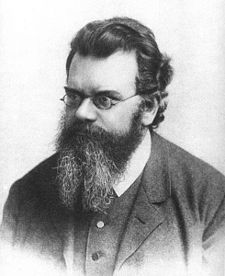Not intended for inclusion in the talk.
1844 - 1906
Austrian physicist and philosopher whose greatest achievement was in the development of statistical mechanics, which explains and predicts how the properties of atoms . . .determine the physical properties of matter... . source terms explained later
less complicated here

Boltzmann's Entropy and Time's Arrow links added punchline at 19
- Given that microscopic physical lows are reversible, why do all macroscopic events have a preferred time direction? Boltzmann's thoughts on this question have withstood the test of time. source
- As an example of entropy more disorder, for a glass of ice water in air at room temperature, the difference in temperature between a warm room (the surroundings) and cold glass of ice and water (the system and not part of the room), begins to equalise as portions of the thermal energy from the warm surroundings spread to the cooler system of ice and water.
- Over time the temperature of the glass and its contents and the temperature of the room become equal. In other words, the entropy of the room has decreased as some of its energy has been dispersed to the ice and water.
- However, as calculated in the example, the entropy of the system of ice and water has increased more than the entropy of the surrounding room has decreased. In an isolated system such as the room and ice water taken together, the dispersal of energy from warmer to cooler always results in a net increase in entropy.
- Thus, when the "universe" of the room and ice water system has reached a temperature equilibrium, the entropy change from the initial state is at a maximum.
- The entropy of the thermodynamic system is a measure of how far the equalization has progressed.
- Thermodynamic entropy is a non-conserved state function that is of great importance in the sciences of physics and chemistry.
- Historically, the concept of entropy evolved to explain why some processes (permitted by conservation laws) occur spontaneously while their time reversals (also permitted by conservation laws) do not; systems tend to progress in the direction of increasing entropy.
- For isolated systems, entropy never decreases.
- This fact has several important consequences in science: first, it prohibits "perpetual motion" machines more; and second, it implies the arrow of entropy has the same direction as the arrow of time more. youtube
- Increases in entropy correspond to irreversible changes more in a system, because some energy is expended as waste heat, limiting the amount of work a system can do.
- source
Paper with the same (red) title above here.
Austrian physicist and philosopher whose greatest achievement was in the development of statistical mechanics, which explains and predicts how the properties of atoms . . .determine the physical properties of matter... source links added